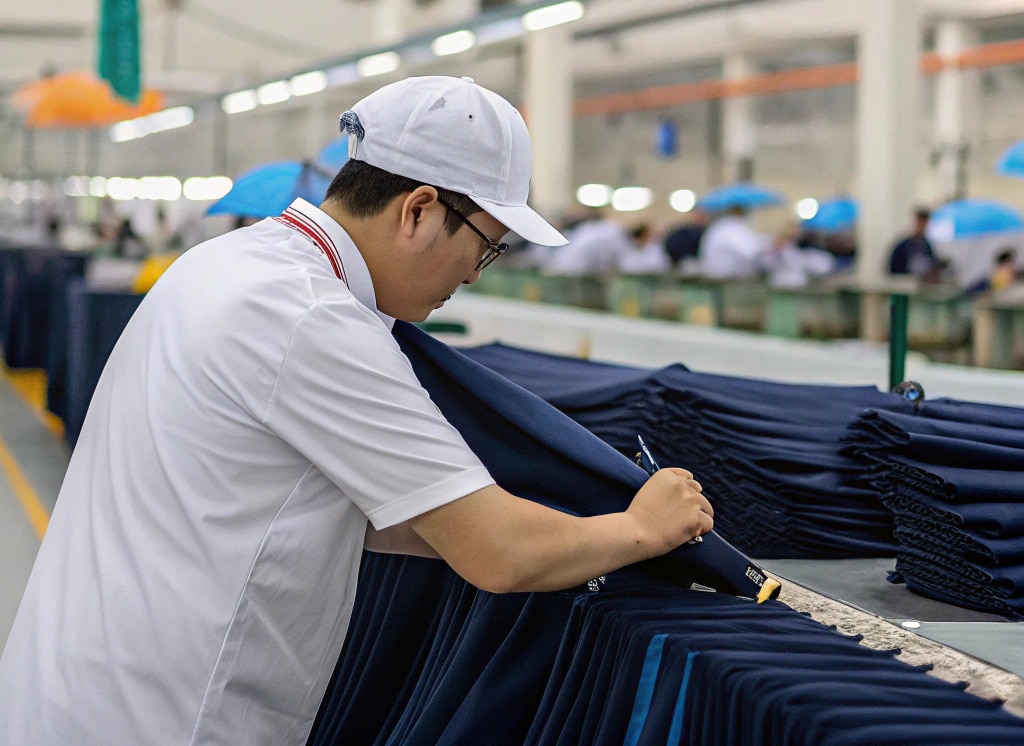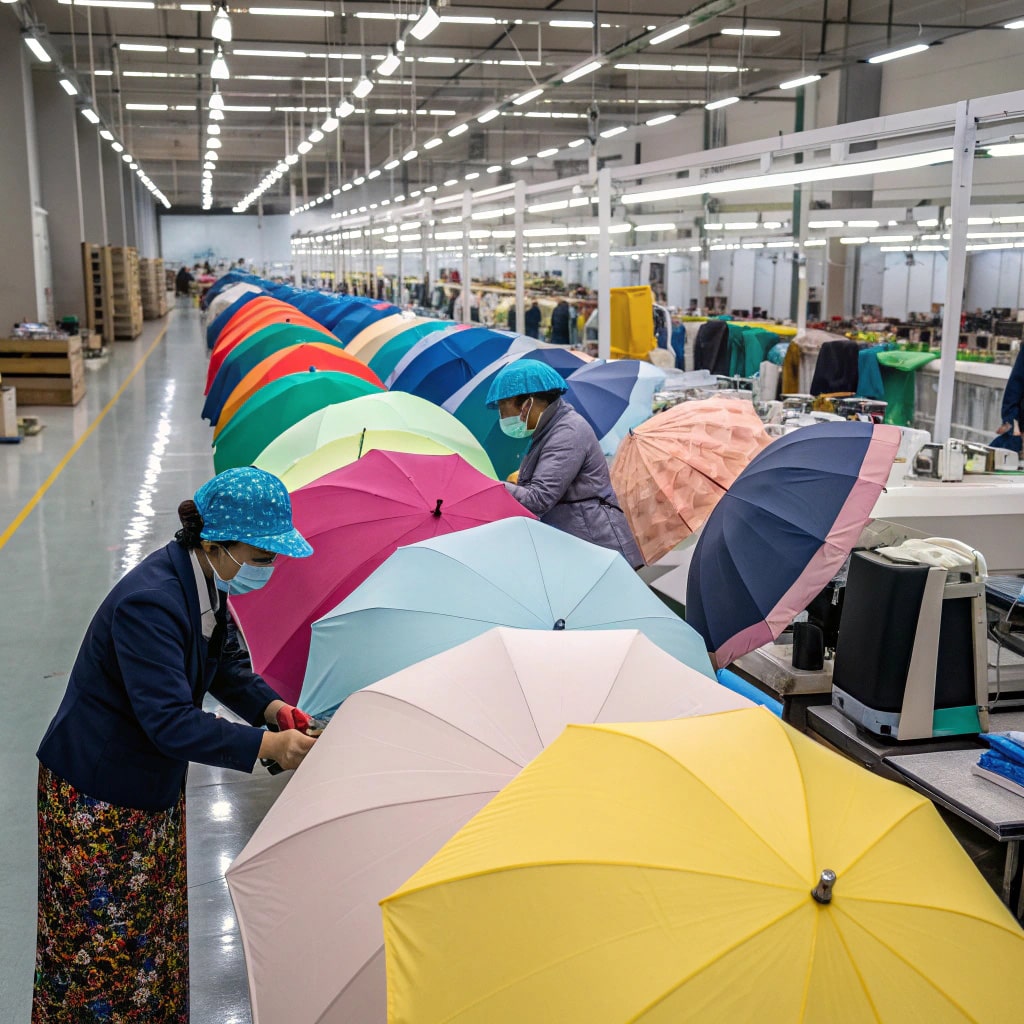Buying umbrellas in bulk can be confusing when you’re faced with both trading companies and manufacturers offering similar products. In the umbrella industry, understanding who you’re dealing with (and why factory-direct sourcing matters) can have a big impact on quality, pricing, and delivery speed.
This article explains the difference between umbrella traders and manufacturers. It shows why working directly with a factory like HF Umbrella often means better control, lower costs, and faster service. Trading companies, while sometimes convenient, may introduce extra costs, delays, and quality risks.
Table of Contents
Trading Companies vs. Manufacturers: What’s the Difference?
A manufacturer makes the umbrellas from cutting fabric to assembling frames. A trading company doesn’t produce the umbrellas themselves. They buy from one or more factories and resell to buyers. They act as the middleman.
You can usually tell who’s who by the product range. A trading company might offer umbrellas, gadgets, clothing, or some other kind of broad mix. A real manufacturer tends to focus on a few core items they make in-house.
Why does this matter?
Because the manufacturer has full control over how your product is made. With a trader, you’re removed from the source. That can lead to slower communication, less flexibility, and quality inconsistencies.
While some traders provide responsive service and smooth ordering, they don’t oversee production. Manufacturers, on the other hand, combine communication with hands-on control of every step in making the product. That difference shows up in every area: quality, cost, and delivery speed.
Quality Control and Production Oversight
Quality is one of the first areas where the difference becomes clear.
Manufacturers control the process directly… their own workers, equipment, and quality checks. If there’s a problem, they can fix it straight away. They are accountable for what leaves the factory.
Traders rely on external factories. They can pass instructions, but they don’t run the production floor.
In some cases, traders choose cheaper factories to keep their own costs down. These suppliers may not meet international quality standards. The trader has to “coach” them to meet the buyer’s expectations, often learning from mistakes made along the way.
Worse still, traders may not be transparent. If a delay or defect happens, some avoid telling the buyer, worried it might lead to cancelled orders or discounts. They might even skip quality checks altogether, leaving the buyer to discover problems after delivery.
Manufacturers, by contrast, welcome oversight. You can inspect their factory or hire third-party checks. If you flag an issue, they can immediately take corrective action. You’re speaking directly to the people in charge of quality.
Instructions also travel faster. With a manufacturer, you explain your needs once, directly to the source. With a trader, your request is passed on. There’s more risk of delays or miscommunication.
Factories can also enforce higher standards. They can train staff, upgrade tools, and improve processes over time. A trader can ask for changes, but they don’t run the factory… they rely on goodwill or leverage, which isn’t guaranteed.
In short, a direct manufacturer offers transparency, accountability, and consistent quality. A trading company often cannot, simply because they aren’t in charge of production.
Pricing and Cost Implications
Another major difference is price.
When you buy direct from a manufacturer, you get factory pricing. There’s no extra markup for a middleman.
Traders add their own margin (sometimes 10 to 20% or more) on top of the factory’s price. You pay more for the same product, just to cover the trader’s commission.
Some traders claim they secure better factory rates by combining volume across multiple clients. Even if true, they still add their own margin. You’re still likely to pay more than you would going direct.
And if the trader isn’t transparent, you might not even realise how much of your cost is markup.
Manufacturers are also more open to discussing production costs, materials, packaging, and shipping. With no one in between, you can negotiate directly and clearly understand where your money is going.
On logistics, manufacturers often help arrange shipping too. Many, including those in China, have experience with international orders and can recommend cost-effective options. A trader may also handle shipping, but may charge extra or choose less efficient routes.
For bulk orders or ongoing supply, the cost savings of going factory-direct can add up fast. You get better pricing, more visibility, and more room to customise your offer without blowing your budget.
Communication and Speed of Feedback
Fast communication makes projects run smoother. And this is another area where manufacturers shine.
When you work with a factory, you’re talking to the people actually making your umbrellas. Questions, changes, or problems can be addressed quickly.
If you’re working with a trader, every message has to go through them first and then passed on to the factory. That extra step slows everything down. Even small changes can take longer to confirm.
For example, imagine you want to switch the fabric colour after seeing a sample. With a factory, you can check in with the production manager directly. With a trader, you send your request, then wait for them to ask the factory and get back to you.
In time-sensitive projects, those delays can cost you.
Many factories now have export teams with English-speaking staff. If you find one like that, you get the best of both worlds: direct communication and technical capability.
Traders often advertise their service in English as a selling point. But that’s also part of the cost… you’re paying for the convenience, not the production.
On delivery times, manufacturers often give more accurate estimates and can sometimes offer faster turnaround. A factory will prioritise direct customers. Traders are just one of many clients, and the factory might not give their orders top priority.
Flexibility and Customisation
If you want something unique (a custom shape, handle, print, or packaging) a manufacturer will usually be more helpful than a trader.
Factories have the tools, materials, and engineers to tweak products or create something from scratch. You can speak to their team, get advice, and see what’s possible.
Traders depend on what their partner factories offer. If your request is unusual, they may not have a supplier who can meet it, or might discourage you from pursuing it altogether.
Manufacturers, by contrast, are used to dealing with technical details. If you need a specific Pantone colour or want to add features, they can usually make it happen (especially for larger orders). You’re not relying on a third party to interpret or “sell” your idea.
There’s a good example from HF Umbrella’s experience. A client had an idea for a folding umbrella that could hang up easily, a non-standard design. Ten other suppliers turned it down. HF Umbrella said yes. As a manufacturer, they could develop it and it went on to sell well in Japan. That kind of adaptability is hard to find in a middleman.
Even for smaller changes, like packaging or branding, a manufacturer is more likely to say yes. Traders don’t have the same flexibility, and if the factory refuses, the trader can’t do much.
There’s a belief that only trading companies support low minimum orders, but many manufacturers are now small-business friendly. HF Umbrella, for instance, welcomes small runs and offers quick sampling. Flexibility isn’t just about product, it’s also about how the supplier treats your business, regardless of size.
In short, for anything beyond an off-the-shelf umbrella, factory-direct is the way to go.

HF Umbrella: A Factory-Direct Partner, Not a Trading Company
HF Umbrella is a true manufacturer, not a middleman.
They operate their own factory in Guangzhou, China, and have been making umbrellas since 1987. That’s over 30 years of experience, with a reputation built on producing umbrellas from start to finish. No outsourcing.
They work directly with businesses all over the world, offering both OEM and ODM services. Whether it’s a basic folding umbrella or a creative custom design, they handle the full process in-house.
Because they control the manufacturing, they also maintain strict quality checks and offer consistent communication. Their team is known for being hands-on and responsive, whether you’re ordering 500 units or 50,000.
HF Umbrella’s pricing is competitive because it’s factory-direct. No hidden broker fees, no extra margins. You get clear quotes and real value for what you’re buying.
In short, HF Umbrella ticks all the boxes: quality, speed, cost, and creativity, all in one place, with no middleman involved.
Conclusion
Choosing between a trader and a manufacturer might not seem like a big deal at first, but it can have a major impact on your order.
Traders offer convenience, but at a cost. You’re paying more, giving up visibility, and often waiting longer for answers. Quality control is limited, and customisation can be tricky.
Manufacturers give you better pricing, faster communication, stronger quality control, and more room to customise. You’re dealing with the source, which means fewer surprises and more trust
HF Umbrella is one of those rare manufacturers that combines factory pricing with excellent service. Whether you’re a retailer, corporate buyer, or launching your own brand, working directly with their factory can simplify the whole process.
Working directly with the manufacturer avoids the middleman and surprises.

